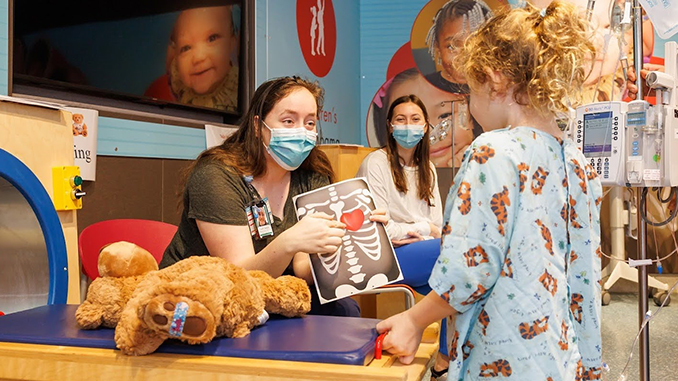
Hospital visits can be scary for a young child. But there’s one team at Children’s of Alabama that works hard to help make hospital visits less scary.
Published: March 10, 2023
March is Child Life Month, a time to recognize the impact child life specialists have on hospitalized children. Child life specialists are trained child-development professionals who work in healthcare settings helping children and their families with the medical process. At Children’s, the Child Life team works to normalize the hospital experience and bring joy and comfort to the patient and their families.
“We recognize that it can be a very stressful and challenging time,” says Noelle Connor, a child life specialist at Children’s of Alabama. “It can be filled with uncertainty, and it can be filled with scary procedures, and it can be painful at times. We want to help children cope with that.”
Some of the services the Child Life team provides include therapeutic activities that encourage normal development and a sense of fun despite challenging circumstances. They also offer play opportunities and peer interactions in playrooms. They use medical preparation materials to help children understand procedures they are about to experience.
Most of the tools, materials and equipment used by Child Life Specialists are available thanks to the generosity of Spire. Spire has been a donor to the Child Life program for several years. Recently, the company sponsored the annual Valentine’s Day Card Drive and matched donations collected during the drive.
“All of us at Spire are passionate about supporting the Child Life program at Children’s of Alabama,” Joe Hampton, president of Spire Alabama, Mississippi and Gulf Coast, says. “The incredible work they do to enrich the lives of their patients has an impact on the whole community. That’s something we strive to do at Spire as well.”
Recently Spire also sponsored a teddy bear clinic for patients. The clinic gives patients a chance to reverse the role of a caregiver. During the clinic, the patient receives a teddy bear and takes it through the procedures like what they are experiencing daily in the hospital. Upon “admission” to the clinic, patients meet their new stuffed animal, give them a name, and support their new friend as they move from triage to surgery. Starting with admission, the bear could go to surgery, have a scan, go to school or even get a cast.
